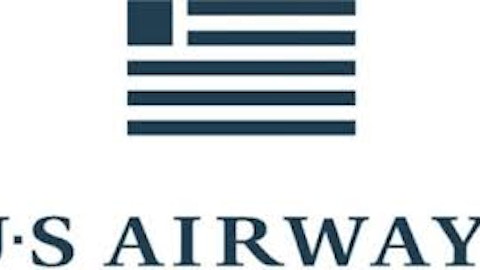Creating the world’s largest airline sounds like the dream of any businessperson with an aviation obsession. For United Continental Holdings Inc (NYSE:UAL), however, the dream has become a nightmare at times, as merger troubles overshadowed the airline’s integration process. With United Continental shares underperforming most industry rivals, can it teach investors any lessons about the perils of airline mergers?
Smooth flight (was) expected
After a successful merger between Delta Air Lines, Inc. (NYSE:DAL) and Northwest Airlines, 2010 looked like another year for airline megamergers. United Airlines and Continental Airlines announced their all-stock merger (the Delta-Northwest merger and the proposed US Airways Group, Inc. (NYSE:LCC) /AMR Corporation (OTCMKTS:AAMRQ) merger were/are all-stock as well). The deal would form the world’s largest airline, with a massive network and a fleet to match.

Technical glitches mean unhappy flyers
It’s difficult enough for offices to merge email systems, so the integration of major airline reservation systems represents what can only be described as a monstrous technical challenge. Unfortunately, this was a major stumbling block for United Continental Holdings Inc (NYSE:UAL), drawing plenty of press coverage.
Whether it was making reservations more difficult, slowing down the process, or just plain crashing, the reservation system integration became a major issue at the airline. The problems managed to link the United Continental Holdings Inc (NYSE:UAL) merger with flight delays in the public’s mind. For a feeling of just how much the press hammered the airline over this, check out these headlines.
- United’s Computer Chaos – The Economist
- United’s Merger Turbulence Hits Elite Frequent Flyers – The Wall Street Journal
- United Airlines still hearing complaints after merger swtichover – USA TODAY
- United-Continental airlines merger hits turbulence – The Minneapolis Star-Tribune
Last month, the airline was fined $350,000 for delaying customer refunds. Not too surprisingly, United Continental Holdings Inc (NYSE:UAL) blamed the issue on merger trouble.
Earnings disappointments
As a merging megaairline, United Continental Holdings Inc (NYSE:UAL) was expected to be an earnings powerhouse, with annual earnings approaching $6 per share. Various merger costs have prevented this from happening, however, as the airline now fights to make half that amount.
Earnings outlook revisions have prevented Wall Street from severely punishing the airline’s stock, instead only causing it to underperform the other major carriers. Fool writer Adam Levine-Weinberg has some good insights on the situation at United Continental Holdings Inc (NYSE:UAL) and its poor earnings pattern.
What it means for American Airlines Group
Much has been made of the proposed merger between US Airways Group, Inc. (NYSE:LCC) and AMR Corporation (OTCMKTS:AAMRQ), parent company of American Airlines. That deal is awaiting a courtroom trial, but the travails of previously merged airlines can provide insight for what could happen in a US Airways Group, Inc. (NYSE:LCC)/AMR Corporation (OTCMKTS:AAMRQ) merger.
First, the stock will probably rise on news of the merger’s completion, since Wall Street loves big mergers that create big airlines. In the case of this merger, it also has the benefit of reducing competition leading to better price control by major carriers.
Investors should take talk of merger benefits with a grain of salt. While the merger will strengthen each airline’s network and likely be a gain in the long run, the new American Airlines Group should expect to incur its fair share of integration costs and possible technical issues.
I still see the merger as a net positive for US Airways Group, Inc. (NYSE:LCC) shareholders (who would gain a greater international network) and for AMR Corporation (OTCMKTS:AAMRQ) shareholders (who are only likely to see any value in their shares if the merger happens.) Airline investors are advised to watch for developments during the integration process, though, since there will almost certainly be challenges along the way.
Awaiting completion
After three years, the United Continental Holdings Inc (NYSE:UAL) merger has annoyed customers with system issues and disappointed shareholders with lackluster earnings. The turbulence seen in this merger should serve as a warning that airline mergers do not always go as smoothly as they are pitched. US Airways Group, Inc. (NYSE:LCC) and AMR Corporation (OTCMKTS:AAMRQ) shareholders need to keep this in mind, should that merger be granted approval. Despite this, airline mergers are a long-term positive for an industry where intense competition has spelled bankruptcy in past years.
Holding United Continental Holdings Inc (NYSE:UAL) now takes a lot of patience, but it could pay off if the airline can make quicker progress and actually meet currently set estimates. And I still see US Airways Group, Inc. (NYSE:LCC) and AMR Corporation (OTCMKTS:AAMRQ) shares as good values if the merger is completed, since each side would gain a larger network, and all carriers would gain greater pricing power.
The article Why This Airline Merger’s Benefits Still Haven’t Taken Off originally appeared on Fool.com.
Alexander MacLennan owns shares of Air Canada, AMR, Delta Air Lines, and Gol Linhas. He is also long the following options: $22 January 2015 Delta calls, $25 January 2015 Delta calls, $30 January 2015 Delta calls, $17 January 2015 US Airways calls. This article is not an endorsement to buy or sell any security and does not constitute professional investment advice. Always do your own due diligence before buying or selling any security. The Motley Fool has no position in any of the stocks mentioned.
Copyright © 1995 – 2013 The Motley Fool, LLC. All rights reserved. The Motley Fool has a disclosure policy.




